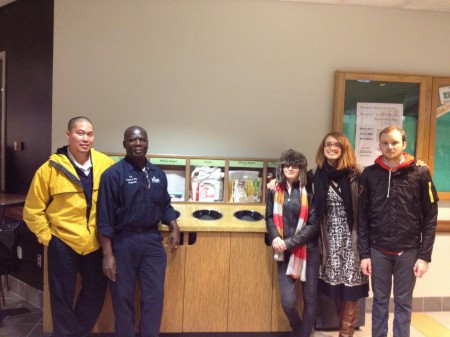George Mason University alumna Danielle Wyman was walking through Whole Foods in Vienna when she spotted the recycling centers at the entrance. She thought, if a grocery store can have something like this, why can’t Mason?
So, after receiving permission from the store, she took pictures and did an in-depth examination of the bins. 
When that particular Whole Foods location underwent renovation, the management team remembered Wyman and how curious she had been about the recycling center. They offered to donate it to George Mason University.
Wyman partnered up with Intergrative Studies major Jen Beidel, an undergrad who was recently hired as an intern at the Office of Sustainability, to build more of the recycling centers.
To fund their project they applied for a grant from the Patriot Green Fund. They will use the grant to build 10 additional recycling centers in the Johnson Center and The Hub.
“It’s not only important that we increase recycling on campus, but also that students and staff can take what they learn here and be able to put it into action at home,” Beidel said.
“It’s about both environmental impact and teaching good habits.”
Of the 22 proposals that were submitted in October 2011, the Patriot Green Fund Committee approved seven projects for grants, according to the PGF website.
They share the $50,000 endowment for this semester between them. The goal is to make the campus more environmentally friendly and to educate students, faculty and staff on sustainability.
“A lot of these things are at the interface of operations and academics,” said Dann Sklarew, fellow of sustainability studies and member of the PGF Committee.
The PGF was approved last year by the school administration. It is the result of a joint effort between the Environmental Action Group and the Office of Sustainability at Mason.
It will give $100,000 each year to fund student and faculty projects that support sustainability research and projects.
“The Patriot Green Fund is contributing to the facilitation of my efforts to combine teaching with research,” said Changwoo Ahn, associate professor of environmental science and policy, who received a grant from the PGF to build a model wetland.
Ahn will use the funds to educate his students on the role wetlands have in reducing carbon dioxide, a greenhouse gas that contributes to climate change.
He will also be able to research how man-made wetlands can be constructed to make up for those that have been lost due to overdevelopment and pollution.
Another beneficiary, Kathleen Curtis, executive director of the Dean’s Office in the College of Humanities and Social Sciences, is working with engineers from campus planning to construct beehives.
“The coursework is focused on the scientific and practical management of honey bee hives in an urban setting,” Curtis said. The beehives will be used for educational purposes and to improve the diversity of the local landscape.
The PGF is helping Mason get closer to the goals of the American College & University Presidents’ Climate Commitment, which President Alan Merten signed in 2007.
This was an agreement that Mason would be climate-neutral by 2050.
“We have a second round of proposals which will be submitted later in the semester,” Sklarew said. “It was actually kind of lucky … we thought we would fund all the proposals that seemed to meet our goals. And that worked out to be about half.”
The remaining $50,000 will be awarded to the winning proposals from the second phase of selection. They will be chosen in April.






Comments